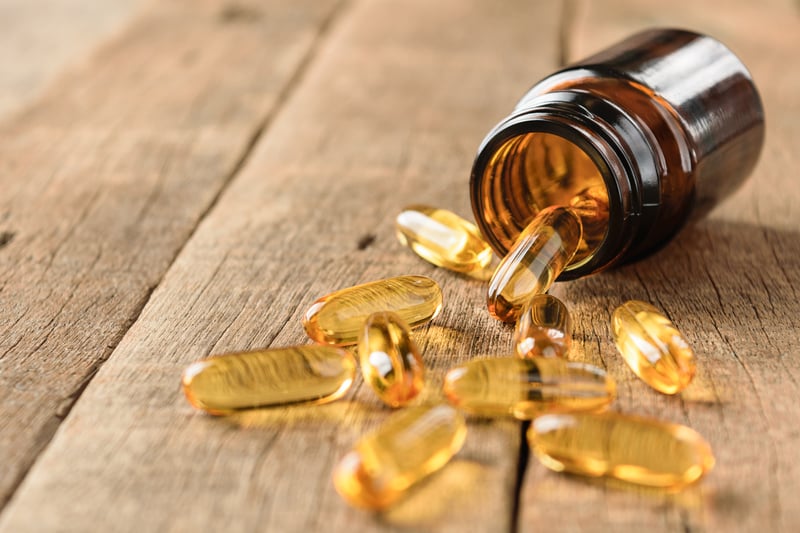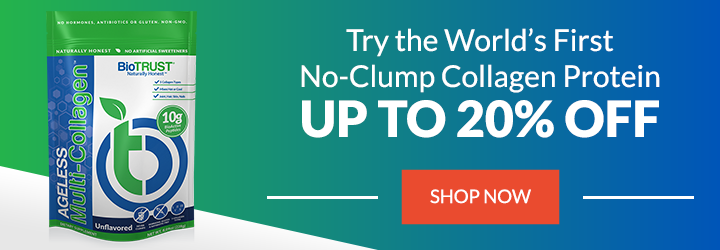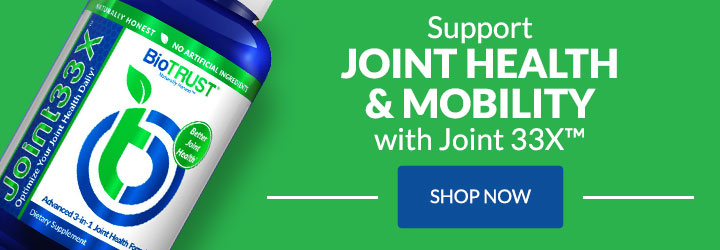Ditch These Popular Joint Health Supplements (Try THESE Instead)

Did you know joint health is one of the TOP TEN reasons people use supplements? Of course you did. That’s why you’re here! That means that joint health supplements rank right up there with vitamins, minerals, omega-3s, probiotics, and protein—supplements you find in virtually every home.
And there’s good reason why joint health supplements are so high in demand. For starters, around the time that most of us reach our 30s and 40s, we start to notice signs of aging. We’re not quite as spry and supple when we wake up in the morning. And when we are active, it often takes its toll in the form of aches and pains, which tend to be more noticeable and last longer—unwanted consequences that typically get magnified over time.
Considering that Baby Boomers are now in their mid-50s, 60s, and 70s, and roughly half of people between the ages of 45 and 65 experience notable joint discomfort, it’s no surprise that joint health is a hot topic.1 Also consider that the rate of obesity is at an all-time high, and carrying extra weight can do a number on joints. On top of that, there’s an embarrassing abundance of highly palatable, ultra-processed junk food—which people are obviously eating—that plays a direct role in declining joint health.
All these things add up to joint stiffness and discomfort. While that alone is bad news, think about the undesirable consequences:
- Reduced likelihood of exercising
- Reduced mobility (to reach, bend over, etc.)
- Reduced ability to perform daily activities
- Increased likelihood of injury (compensation)
What that really adds up to is reduced quality of life. Simply put, joint discomfort means NOT being able to do the things you love to do with the people you enjoy doing them with. And all that is why joint health supplements are so dang popular. BUT, if you were making your choice based on a popularity contest, it would be WRONG.

Say Sayonara to These Common Joint Health Supplements
When you think about joint health supplements, are glucosamine and chondroitin at the top of the list? If so, I wouldn’t be surprised. In fact, according to research conducted by the Council for Responsible Nutrition, glucosamine and chondroitin are the most popular joint health supplements. They rank right behind protein and probiotics, which are essentials for most people.
But as you might have experienced in your life a time or two, popularity should not be confused with effectiveness.
There is good reason why glucosamine and chondroitin might work in protecting cartilage and supporting joint health. For starters, glucosamine is a building block for compounds called “glycosaminoglycans.” These are part of the structure of cartilage. Meanwhile, chondroitin is a natural component of healthy cartilage that helps it retain water.
While that rationale sounds good, the truth is that supplementation with glucosamine and chondroitin results in modest, if any, improvements in joint health. In fact, in the largest, most robust clinical trial (called GAIT)—which was conducted at 16 research centers across the United States and involved over 1,500 participants—researchers found that supplementation with 1,500 mg of glucosamine, 1,200 mg of chondroitin, or both daily for 24 weeks led to NO IMPROVEMENT in joint health or comfort.2 Bummer.
While there are studies suggesting a potential benefit from these popular joint health supplements, researchers have raised their eyebrows and questioned their scientific quality and validity. In general, robust analyses (called meta-analyses) have found no convincing evidence to support the recommendation to use glucosamine and chondroitin for joint health.3,4
In other words, it’s time to make room for a new sheriff in town.

Collagen
Right now, collagen supplements are as hot as a pistol. Considering that collagen is the main structural protein that makes up our connective tissue (like cartilage, tendons, ligaments, and skin), it’s no wonder that supplementation can support joint health. Keep in mind there are different types of collagen. On one hand, collagen protein contains the amino acids proline, glycine, and hydroxyproline (unique to collagen). These stimulate the body’s production of collagen and hyaluronic acid (the fluid that lubricates joints).
There’s also a very unique type of collagen called undenatured type II collagen (branded as UC-II®). It has been shown to protect cartilage from break down. Practically speaking, multiple studies have shown that supplementation with as little as 40 mg of UC-II significantly improves joint health, comfort, and mobility. And for any naysayers out there, UC-II has been shown to lead to 2 – 3 times better results when compared head-to-head with glucosamine and chondroitin.5–7
Boswellia serrata
Also known as Indian Frankincense, Boswellia serrata is a moderate- to large-sized branching tree that grows in dry mountainous regions of India, Northern Africa, and the Middle East. Boswellia has a variety of uses (a prized incense, for instance). It is also one of the most ancient and valued herbs in Ayurveda (Ayur = “life” and Veda = “science” or “knowledge”), one of the world’s most sophisticated and powerful mind-body health systems, according to Dr. Deepak Chopra.
When it comes to joint health, the boswellic acids in Boswellia serrata (such as acetyl-11-keto-β-boswellic acid, or AKBA) have been shown to support a healthy balance of pro-inflammatory compounds (called cytokines). These compounds contribute to joint discomfort and collagen breakdown when they’re out of balance. Research has shown that Boswellia serrata extracts high in AKBA support healthy joints and connective tissues. For example, one study showed that folks who supplemented with 100 mg of AprèsFlex® daily for 90 days significantly reduced joint discomfort and improved physical function. And these improvements were noticeable after just one week.8
Hyaluronic Acid
Joint wear and tear is typically characterized by reduced quantity and quality of hyaluronic acid. The primary component of synovial fluid, hyaluronic acid “lubricates” joints and reduces friction. Knowing that decreased levels of synovial fluid leads to joint discomfort, injections of hyaluronic acid are often used to improve joint comfort and mobility.
Recent research shows that supplementation with hyaluronic acid can also be beneficial for joint health. For example, one study showed that daily supplementation with 80 mg of a natural extract rich with a high content of hyaluronic acid (Hyal-Joint®) for 8 weeks significantly reduced joint discomfort and stiffness and improved physical function.9 As an added bonus, Hyal-Joint also contains hydrolyzed collagen protein and other glycosaminoglycans, which all play key roles in joint health and performance.
Curcumin
Like collagen supplements, turmeric and curcumin supplements are hotter than a tea kettle. And once again, there’s good reason (quite a few of them, in fact). Like Boswellia, turmeric (the most popular spice in Indian cuisine and a primary ingredient in curry powder) has a long history of use in Ayurveda, which uses mainly plant-based ingredients to promote health and wellness.
At the top of the list, curcumin offers strong antioxidant properties. Like Boswellia serrata, it is highly regarded for its ability to help support a healthy inflammatory response throughout the body. And while there are numerous factors that contribute to declining joint health, imbalanced, unhealthy levels of oxidative stress and inflammation are major players in joint discomfort and stiffness.
Not surprisingly, there’s no shortage of studies showing that supplementation with curcumin provides relief from occasional joint discomfort, enhances physical function, and improves quality of life.10,11 It’s important to keep in mind that not all curcumin supplements are created equal, however.
Generally speaking, curcumin is poorly absorbed. And obviously, if you don’t absorb it, you can’t enjoy the expected health benefits. The good news is there are strategies for increasing absorption. For example, one recent study showed a water-soluble form of curcumin (called CurcuWIN®) was substantially more bioavailable and longer lasting than other formulations. That’s exactly why we use CurcuWIN in our Ageless Body supplement.
Honorable Mention
While the above ingredients top our list of joint health supplements, there are a few more that deserve an honorable mention:
- Vitamin C plays a key role in the body’s production of collagen.
- Vitamin D is crucial for bone health, and low levels have been associated with joint discomfort.
- Vitamin K is also a key player in bone and cartilage health, and insufficient vitamin K levels have been aligned with poor joint health.12
- Magnesium is an essential micronutrient involved in bone and cartilage health, and low magnesium intake has also been implicated in joint discomfort.13
- Omega-3s (DHA and EPA) are essential fatty acids that are highly regarded for various reasons, including helping promote a healthy inflammatory response. Along those lines, DHA and EPA are often touted for joint health, as they have been shown to reduce joint discomfort and stiffness.14
- Bromelain, a compound found in pineapples, has been shown to reduce joint discomfort and stiffness.15








